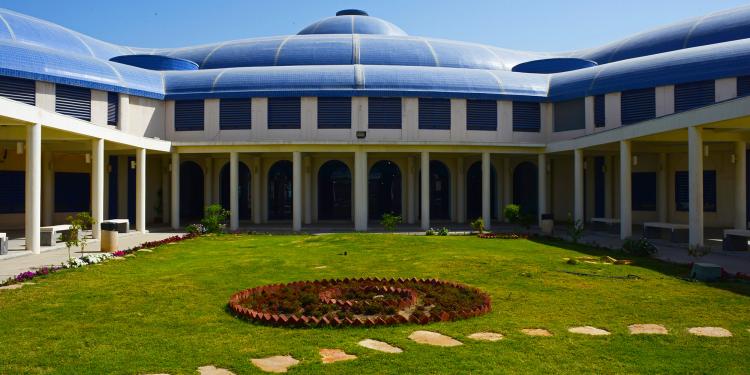These efforts come as part of the Unit's mission to align with global knowledge transformations and to provide a university environment that encourages creativity and innovation.
The Culture and Arts Unit at the College of Arts at Imam Abdulrahman bin Faisal University concluded its activities for the academic year 1446 AH, following a year rich in cultural and artistic programs and initiatives aimed at fostering intellectual awareness and strengthening national identity. These efforts come as part of the Unit's mission to align with global knowledge transformations and to provide a university environment that encourages creativity and innovation.
The Unit’s events included a range of cultural and artistic workshops, specialized lectures, intellectual forums, and community partnerships. In the area of workshops, the Unit organized training programs targeting various groups within the university community. Among the most notable was the workshop titled "Reading Basics and Summarization Skills," presented by Dr. Naif Al-Huboub. Another workshop, "Fakher: Promoting National Identity Through Pottery," was conducted in collaboration with the Community Service Unit at the College of Design and presented by Ms. Ghada Al-Khaldi. Additionally, the Unit held a workshop titled "Warm Weaving: Making a Scarf," in collaboration with the “Anamel” Club under the Deanship of Student Affairs and led by Ms. Zahraa Al-Darwish. A special workshop was also offered to female university affiliates titled "Salsalah: Contemporary Authenticity – Pottery Making," presented by a group of specialists under the supervision of Dr. Feryal Al-Kurdi.
On the cultural side, the Unit continued its work on the "Cultural Café" program, which featured dialogue sessions under the theme "Qahwa, Waraq, Ziyadah," offering diverse readings across intellectual and knowledge-based topics. A distinguished lecture titled "Whispers of Hooves: Myths and Stories of Camels in Arab Culture" was presented by researcher and historian Qassim Al-Ruwais, in celebration of the Year of the Camel 2024. The Unit also hosted students from the College of Architecture and Planning who won the "Watan Monument" competition, where they presented their project titled "Midan Al-Thoud: Camels from an Architectural Perspective." In addition, it organized a session titled "Ramadan Culture," which hosted Dr. Omaimah Al-Maghrabi, Dr. Youssef Al-Qurashi, and Dr. Fatimah Al-Kaltham to discuss the religious, social, and health dimensions of the holy month of Ramadan.
The academic year also included a literary lecture delivered by Dr. Abdullah Al-Khudair titled "The Emotional Dimension in Wall Literature: A Semiotic Reading." The Unit also organized cultural activities in partnership with external entities, including hosting a dialogue session organized by the Visual Arts Commission titled "Manal AlDowayan: The Spears Spoke, and the Sound Moved," in light of her participation in the Saudi Pavilion at the 2024 Venice Biennale. Furthermore, the Unit arranged a visit for female students from the College of Arts to attend the theatrical performance "Abracadabra," in cooperation with the Community Partnership Office and Al-Hussan Model Schools.
In celebration of local and international occasions, the Unit launched the fourth edition of the Poetry Creativity Award under the theme "Camels: A Deep-rooted Cultural Symbol in the Kingdom of Saudi Arabia," in honor of the Year of the Camel 2024. It also contributed to organizing an event titled "Arabic Language and Artificial Intelligence: Enhancing Innovation While Preserving Cultural Heritage," which was accompanied by the exhibition "Proud of It," held in conjunction with World Arabic Language Day and with the participation of the King Salman Global Academy for the Arabic Language and the Saudi Data and Artificial Intelligence Authority (SDAIA).
The Culture and Arts Unit concluded its activities for the year with a lecture by Mr. Jalal Al-Haroun, a researcher in the history of the Kingdom and the Gulf, titled "Ras Tanura: Emergence and Development." Through this, the Unit reaffirms its ongoing commitment to delivering distinguished cultural initiatives that contribute to building a vibrant university community, strengthen national belonging, and keep pace with modern cultural and intellectual changes.




